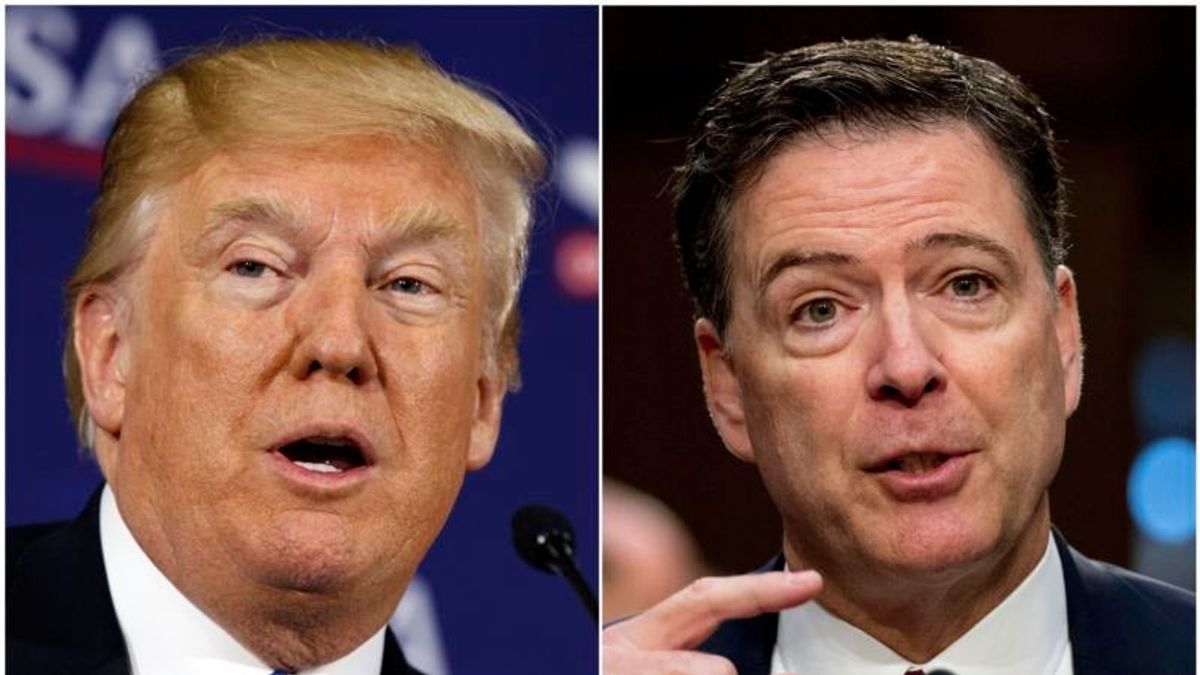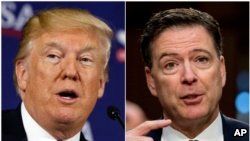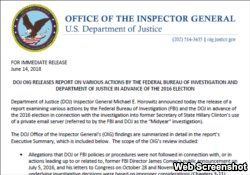
Trump: DoJ Report Biased, Reached Wrong Conclusion
Trump: DoJ Report Biased, Reached Wrong Conclusion

WASHINGTON —
United States President Donald Trump said Friday the Justice Department's inspector general's report on the Hillary Clinton email probe reached the wrong conclusion when it determined there was no bias in the agency's handling of the investigation.
"The end result was wrong," Trump said in an interview on the Fox News Channel. "There was total bias when you look at [FBI agent] Peter Strzok, what he said about me, when you look at [then-FBI Director James] Comey and all his moves."
In his first remarks about the report, Trump tweeted earlier Friday the report proves that Comey was an ineffective leader of the FBI and said he did the country "a great service" when he fired Comey.
Trump first took Strzok to task Friday on Twitter for texting during the investigation that "we'll stop" Trump from winning the presidency, a revelation that was disclosed when the report was issued Thursday, and Trump praised current FBI Director Christopher Wray for his leadership of the embattled agency.
DoJ's report
In the report, the Justice Department's internal auditor on sharply criticized Comey for his handling of the Hillary Clinton email probe during the 2016 election, but said investigators found no evidence that his conduct was motivated by "political bias."
In the long-awaited report, the department's inspector general, Michael Horowitz, blasted Comey for a series of controversial steps he took during the investigation, including publicly exonerating Clinton in the midst of the campaign and then reopening — and later closing — the probe just as the November election was drawing near.

Comey's move to clear the Democratic candidate of any wrongdoing at a July 5, 2016 press conference, without coordinating with the attorney general, "was extraordinary and insubordinate," the inspector general wrote, while his decision to send a letter to members of Congress on Oct. 28, 2016, despite the attorney general's opposition, informing them that he was reopening the investigation, constituted "a serious error of judgment."
These and other missteps by Comey and other FBI and Justice Department officials damaged the FBI's credibility, Horowitz concluded in his 500-page review of the investigation, which took 18 months to complete.
"While we did not find that these decisions were the result of political bias on Comey's part, we nevertheless concluded that by departing so clearly and dramatically from FBI and department norms, the decisions negatively impacted the perception of the FBI and the department as fair administrators of justice," Horowitz wrote.
Comey's defense
Comey has stood by his actions. He told investigators the FBI found itself in the middle of a "500-year flood" and that he "weighed the need to preserve the credibility and integrity of the Department and the FBI."

In a recently released book, Comey wrote that he decided to do "something I could never imagine" in order to protect the bureau's reputation after concluding that then-Attorney General Loretta Lynch "appeared politically compromised" by her association to the Clintons.
In a Twitter message posted Thursday afternoon, Comey wrote that the inspector general's "conclusions are reasonable, even though I disagree with some."
"People of good faith can see an unprecedented situation," he wrote.
In a statement, Attorney General Jeff Sessions said the report shows "a number of significant errors by the senior leadership of the Department of Justice during the previous administration."
"Accordingly, this report must be seen as an opportunity for the FBI — long considered the world's premier investigative agency — and all of us at the Department to learn from past mistakes," Sessions said.

A new leadership team brought in by the Trump-appointed Wray is "one in which the American people can have confidence," Sessions said.
Speaking at a news conference at FBI headquarters, Wray said the bureau accepted the findings in the report but noted that it in no way "impugns the integrity" of the agency.
Tags
US Politics Members of Congress Take to Baseball Field Year After ShootingNext PostTrump Says It’s ‘Possible’ He’ll Meet With Putin This Summer
Members of Congress Take to Baseball Field Year After ShootingNext PostTrump Says It’s ‘Possible’ He’ll Meet With Putin This Summer







